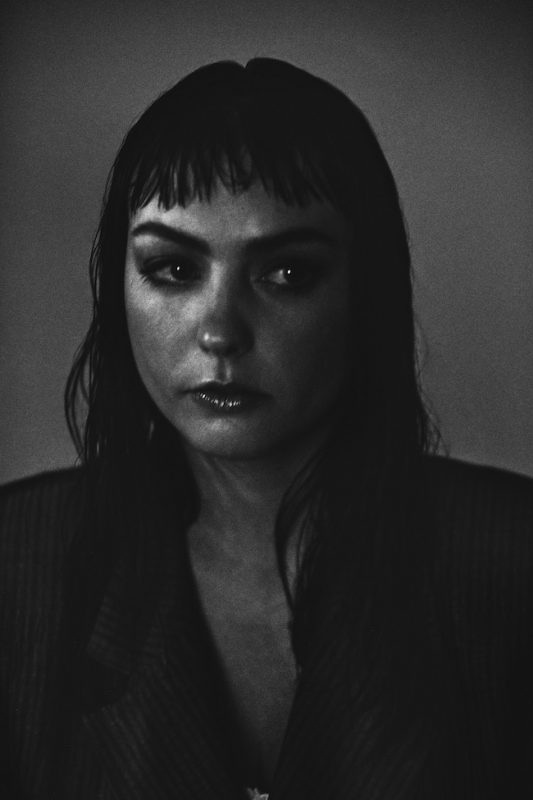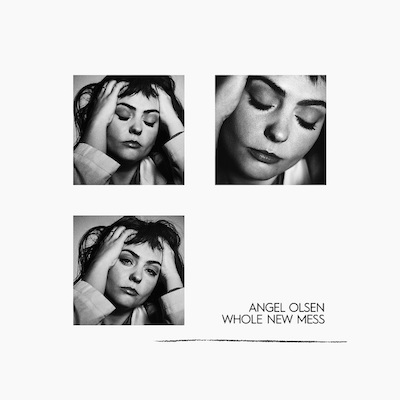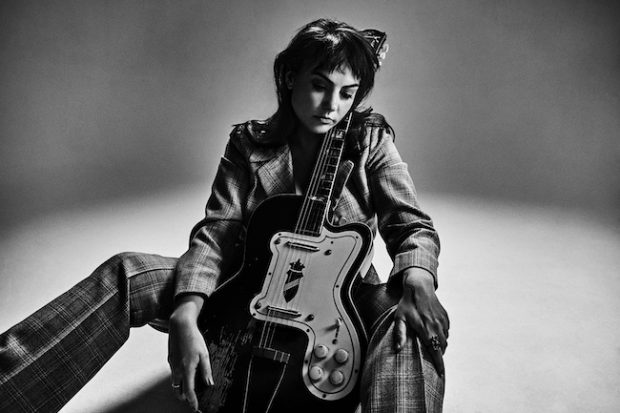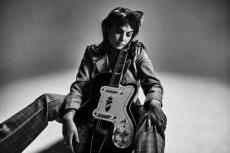「時々、歌はあなたが認識していなかった痛みを気付かせるような気がします。しかし、それは悪いことではないと思います。知ったら治すことができるのですから」エンジェル・オルセン『Whole New Mess』インタビュー/Interview with Angel Olsen about “Whole New Mess”
NeoL / 2020年10月15日 17時0分
「時々、歌はあなたが認識していなかった痛みを気付かせるような気がします。しかし、それは悪いことではないと思います。知ったら治すことができるのですから」エンジェル・オルセン『Whole New Mess』インタビュー/Interview with Angel Olsen about “Whole New Mess”
アメリカのイリノイ州シカゴを拠点に活動するシンガー・ソングライター、エンジェル・オルセンの最新アルバム『Whole New Mess』がリリースされた。『Whole New Mess』は、昨年リリースされ高い評価を受けたアルバム『All Mirrors』のオリジナル・レコーディングで構成された作品になる。ただし、これはいわゆる習作的なデモ音源集とはまったく似て非なる作品であることを留意されたい。かたやオーケストラルなアレンジで華美に飾られた『All Mirrors』に対し、古い教会でギターと数本のマイクのみで録音された『Whole New Mess』の楽曲は、親密だが真に迫るような力強さで聴き手に――悲しみと喪失について――訴えかけてくる。「今、私たちは私たちの生活の中で、そしてお互いに、気にかけているすべてのものを本当にちゃんと見ておく必要があります」。以下のオルセンの口ぶりからは、『Whole New Mess』並びに『All Mirrors』の制作が彼女にとって大きな気づきをもたらす経験であったことが窺える。(→ in English)
ーーまずは今回の『Whole New Mess』について伺う前に、昨年リリースされた『All Mirrors』の話を聞かせてください。両アルバムはその制作の経緯からして、双子の関係にあるような繋がりの深い作品同士といえます。
Angel Olsen「私にとって、『All Mirrors』と『Whole New Mess』は、互いに平行しているような作品たち。それらは友人やパートナーのような人たちとの対峙、ロマンチックなこととビジネス、怒りと失望を歌に注ぎ込む方法を見つけたことについて語られています。私は自分の生活に他者が存在しないような感じで動き続けていましたが、人々との関係にも熱心に取り組んできて、今は共に以前よりずっと良い状態になっています。ですから、そのようなことをたくさん語ることができて本当に良かった。手遅れになる前に、自己認識をして境界線を作ることが私にとっては大切なんです」
ーー『All Mirrors』はそれまでのあなたのディスコグラフィを通じて、サウンド面でもっとも冒険的で野心的で、パワフルなレコードだったと思います。改めて、あの大胆な変化をもたらしたインスピレーションはどこから生まれたものだったのでしょうか。
Angel Olsen「失望から生まれました(笑)。私にインスピレーションを与え、失望させたものから生まれたのです。そして人としての自分自身から。最初に『Whole New Mess』をレコーディングしました。そのレコードを作った時、私はとても悲しかったし、まだたくさんの失望感を抱いていました。だから私はある種のことをやる必要があったのです。当時、他の3人のコラボレーターとそれを共有して、自分の心を守るためにも彼らに曲の作業をすることを委ねました。そして正直なところ、そうやって曲を追加し、曲から離れることで『All Mirrors』を作ることができました。より脆いやり方ですが。私は曲たちにとても感情的に寄り添っていたので、演奏してレコーディングするのは非常に困難でした」
ーー今回の『Whole New Mess』については、『All Mirrors』のデモ音源集と理解、いや誤解しているひとも少なくないかもしれません。リリースにあたって考えていたのはどんなことでしたか。
Angel Olsen「私は、音がどこから始まり、人々と共有したときにどのように変化するかを示したかったのです。言葉の文脈も、音楽やトーンが異なると変化します。それは私にとっての実験であり、聴く人々にも同じ実験をしてもらいたかったのです」
ーー『Whole New Mess』には『All Mirrors』の原型となった楽曲が収録されているわけですが、あなたのいう通り、しかしふたつのアルバムは単純に時系列で並べたり比較される作品ではなく、それぞれの楽曲によって聴き手が喚起される感情や景色はまったく異なるものだと思います。実際のところ、『Whole New Mess』と『All Mirrors』はあなたの中でどのような関係にある作品といえるのでしょうか。
Angel Olsen「片方はより脆弱な見地に立ったもので、もうひとつは興奮状態にあるシアトリカルな見地に立ったもの。 最初に録られた『Whole New Mess』は悲しみと喪失についてでした。『All Mirrors』は、実際には分け与えてはいないものを分け与えたと捉えることに対しての怒りと、一種の躁病的アプローチに関するものです」
ーー例えば、『All Mirrors』では“Too Easy”だった楽曲が“Too Easy (Bigger Than Us)”、“Tonight”は“Tonight (Without You)”、“Chance”は“Chance (Forever Love)”と今回の収録にあたってタイトルが変えられていますが、これはどのようにして決めていったのでしょうか。
Angel Olsen「パブリッシングの理由だけでなく、曲がさまざまな異なるものを表しているためです。より脆く骨っぽかったので、異なるタイトルにした方がいいと感じました」

ーー今回の楽曲は「太平洋岸北西部にある100年の歴史を持つ古い教会」で録音されたそうですが、どんな場所なのか教えてください。そこを選んだ理由、また録音中のエピソードなどあれば。
Angel Olsen「私は『Burn Your Fire for No Witness』(2014年)を書く前、2011年か2012年に女性の執筆家のためのレジデンシーでシアトル郊外のウィッビー島でしばらく過ごしました。それらのトラックの共同プロデューサーとなるマイケル・ハリスと一緒に場所を探していたのですが、彼からフィル・エルヴラムがマイクロフォンズのレコードの多くをレコーディングしたという場所に行くことを提案されたのです。私はフィルの連絡先を持っていたので彼にメッセージを送ったところ、彼はすぐに私に電話をくれました。『私はもう関わっていませんが、価値があるかどうか見てみたら良いと思いますよ。何を探しているのかはわかりませんがね』と」
ーーへえ。
Angel Olsen「私は素晴らしい機材を備えたスタジオのようなものではなく、多くも必要なく、ただスペースが必要なだけだったのでそこに行ってみました。11日か12日間はいたんじゃないでしょうか。ちょうどハロウィーンの頃でした。そこには幽霊が出ると思っていたのですが、実は私の幽霊だったのかもしれません。たくさんの想いを持ってきたから(笑)。私たちは犬を飼っていたエンジニアのニックと本当に仲良くなり、犬ともたくさん遊びました。ファーマーズマーケットに歩いて行き、毎日カフェに行き、とても綺麗で霧がかかっている森の中にも分け入りました。小さな町の空間です」
ーー資料には「ギターとマイク数本のみでレコーディングされた」とありますが、今回の『Whole New Mess』を聴いて、『Half Way Home』や『Burn Your Fire for No Witness』といった弾き語りをメインに制作された初期の頃のあなたの作品を思い出しました。あなた自身、過去の自分の作品を改めて聴きかえしたくなるようなことはありますか。
Angel Olsen「このライヴ・ストリームをやっているので最近は聴いていますね。しかし、この時点ではもはや他の誰かをカバーするようなものです。ライティングも大きく変わりましたから。それと今回に関しては、何よりも『Whole New Mess』に『Strange Cacti』(※2010年に発表されたデビューEP)を反映させたかったのです。それは間違いなくこのレコードの音のリファレンスだったので。自分の古い曲を聴くのが不快な場合もありますし、私が行ったような音のチョイスではほとんどが不快になるのですが、今回は全く気になりませんでした。ギターの音色や何かそういうもので、私が誰であるか、そしてどれだけ成長したかを知ることができます」
ーー“成長”とは確かにいわれた通りで、かたや初期の作品と明確に異なるのは、あなたの歌声だと思います。それこそ『All Mirrors』においてはオペラにも喩えられるようなスケール感と力強さに圧倒されましたが、自身のボーカリゼーションの変化について意識している部分だったり、新たな気づきなどありましたら教えてください。
Angel Olsen「私が生きる人生と物事は私の声を変えます。つまり、人生はあなたの声を変えるのです。それは『My Woman』(2016年)から始まりました。 私はディスコ、ロックンロール、ギター・ソロ、ジャズなど様々なことにトライしようとし、実際にやりました。その時は人とコラボレーションすることが多かったので、そのようにレコードを作り、ソロ作品ではやったことのない方法で声を出しました。そのために、自分の異なる声にフィーチャーしたアルバムを作りたいと思ったのです。そこから、自分にとって最も快適な声と最も役立つ声を見つけました。今は自分のヴォーカルに満足していますが、いつまた変わるかはわかりません」
ーーアルバム・タイトルの「Whole New Mess」は楽曲の題名でもありますが、このフレーズが選ばれた理由、またこのフレーズにはどんな意味が込められているのか教えていただけますか。
Angel Olsen「両方のレコードについてのちょっとした“免責事項”という意味合いです。私はセルフ・プロモーション、つまり人生で学んだことを取り入れ、混乱と歌を整理して人々に届けることのサイクルを繰り返していますし、そうしていたい。このタイトルは『悲しい歌として聴くこともできるけど画期的な曲だと考えるべき』と伝えているのです」
ーー“Chance (Forever Love)”の「I wish I could un-see some things that gave me life/I wish I could un-know some things that told me so」というラインが印象的です。この曲はどのような着想から生まれた曲なのでしょうか。
Angel Olsen「それは将来のパートナーと過去のパートナーの一部に対して責任を手放すことです。『私はすべてを必要としないし、永遠には信じない。でも、なぜ今やらない? 今やることがとても大切。今言葉にすることはもう重要じゃない』というようにね。私は失恋と誤解からアイデアを得ました」
ーー今回の『Whole New Mess』には収録されていないのですが、『All Mirrors』に収録された“Endgame”について、あなたはApple Musicのインタヴューで「needing communication and understanding and patience」についての歌だと話していました。この秋にはアメリカで大統領選が行われます。世界中で分断と対立が進んだこの4年間を通じて、忍耐や寛容さを持って相手を理解して寄り添うことの大切さが改めて見つめ直されたと思います。“Endgame”はあくまでラブソングという形がとられていますが、この曲が意味するメッセージについて伺えますか。
Angel Olsen「この曲は、友達の誰かに平和的な別れを告げるもの。『終わらせる必要はないけど、今は終わらせる』と言っているだけです。今、私たちは私たちの生活の中で、そしてお互いに、気にかけているすべてのものを本当にちゃんと見ておく必要があります」
ーーちなみに、今回収録された“Whole New Mess”と“Waiving, Smiling”が、『All Mirrors』用にフルバンドで再レコーディングされなかったのはなぜですか。
Angel Olsen「その曲たちはフィットしなかったのです。 “Waiving, Smiling”は“Chance”に近かったのですが、私はそれを別の方法で独自のプラットフォームとした方がいいと思いました。多くの人がその曲を聴いて悲しみを覚えますが、私にとっては本当に何かを克服した曲なのです」
ーー新型コロナ・ウィルスの影響で自粛や隔離、孤立を強いられる日々が続いています。音楽に限らずアートはそうした人々の気持ちを支え、傷を癒し、あるいは一つにするものだと思います。けれど最近の自粛生活の中で、部屋でレコードを聴いたりオンラインでドラマや映画を見たりしていると、「アートは孤独を助長するのではないか」と思うことがあります。あなたはどう思いますか。
Angel Olsen「状況次第だと思います。マッサージを受けるようなものですね。痛みがあるのでマッサージを受けに行き、自分がどれだけの痛みを感じているかが正確にわかったことで傷に気づく。時々、歌はあなたが認識していなかった痛みを気付かせるような気がします。しかし、それは悪いことではないと思いますよ。人々は痛みを和らげる方法を理解し、知る必要があると思います。知ったら治すことができるのですから。アートはあなたを考えさせるものでしょう」
ーー『All Mirrors』では黒で統一された衣装やアートワークが目を引きました。その前の『My Woman』ではプラチナ・シルバーのウィッグをつけたあなたが歌う“Intern”のMVも印象的でしたが、作品のリリースに合わせて衣装なりメイクなりといったヴィジュアルのイメージを変えられると思います。その点に関して、今回の『Whole New Mess』に際してあなたが考えていたコンセプトやアイデアなどありましたら教えてください。
Angel Olsen「私はとても視覚的な人間です。小さい頃はストップモーションのフィルムを作っていました。今ではそのかわりに音楽をやることになりましたが、編集はとても楽しいです。自分が必ずしもフィルムに出演する必要はありませんが、時によってはそれも楽しいでしょうね。他の誰かのプロジェクトのヴィジュアル・エンジニアになりたいくらい。私の物語の多くは歌に由来しています。それは私の個人的な経験から始まりますが、私が視覚的に物事を捉えていることにもインスパイアされています。ですから、私がそのプロセスに密接に関わることは当然なのです。ヴィジュアルはとてもパワフルだと思います」
ーーええ。
Angel Olsen「最新のアルバムでは、男性的で同時に女性的なものにしたかったのです。私は自分が見ないことにしていた自らの女性的な男性性の神話を示したかったのです。私のヴィジュアルのほとんどは60年代のピンナップスタイルのドレスのようなものですが、私には男性的な側面があり、両方を受け入れていることをこそ本当に表現したかったのです。すべての人とすべてのトーンをそのままに受け入れるのは美しいことですよね」
ーー『All Mirrors』がリリースされた昨年は2010年代の最後の年ということで、この10年間を総括する企画や特集が各所で見られました。先ほど話に出た『Strange Cacti』であなたがデビューを飾ったのは2010年になりますが、あなた自身はこの10年間をどう振り返りますか。
Angel Olsen「リーダーになったので、人々を導くことの意味を学び、難しい会話を快適に行う必要がありました。そのため、私も自分自身と向き合う必要があったのです。お金に関する事柄だけでなく、人々と創造的にコラボレートすることの意味について考えることも重要でした。そして、いくつかの関係においては、感情的なものをいくら捧げても1ドルも出せないということも知りました。それは私にとって本当に大きな教訓となりました。感情的な努力にはお金を払うことができない。したいのですができません。人々と関わり、自分が意味していることを正確に伝え、計画通りに進め、問題を解決していくことは本当に大変でした。私は音楽を演奏していると思っていましたが、ビジネスを始めていたのだと知らされました」
ーー最後にもうひとつ。テイラー・スウィフトの新しいアルバム『folklore』は聴かれましたか。ザ・ナショナルのアーロン・デスナーやジャスティン・ヴァーノン(ボン・イヴェール)との共作が話題になりましたが、率直な感想、あなたの所感を伺えたら嬉しいです。
Angel Olsen「いいえ、聴いていません。そのアルバムについての話題は聞きました。多くのアーティストが似たように考えています。私たちは常にアイデアを盗むわけではなく、お互いに影響を及ぼし合っているのです。それはまさに世界の仕組みそのもの。抗議のメッセージは、知らず知らずに影響力を持つ可能性があります。レコードについては何も知りませんでしたが、いくつかのトラックを聴いてみて、本当に美しいと思いました」
text Junnosuke Amai
edit Ryoko Kuwahara

ANGEL OLSEN
『WHOLE NEW MESS』
(Big Nothing /Ultra Vibe)
http://bignothing.net/angelolsen.html
■収録曲目:
1. Whole New Mess
2. Too Easy (Bigger Than Us)
3. (New Love) Cassette
4. (We Are All Mirrors)
5. (Summer Song)
6. Waiving, Smiling
7. Tonight (Without You)
8. Lark Song
9. Impasse (Workin’ For The Name)
10. Chance (Forever Love)
11. What It Is (What It Is)

- First of all, please let me ask you little bit about “All Mirrors” before “WHOLE NEW MESS” as I think those two records are deeply connected like twins. “All Mirrors” is the highly acclaimed record which also selected as the album of the year by lots of media. How would you describe the album yourself? What did the record mean to yourself?
Angel Olsen : For me, “All Mirrors” and and “WHOLE NEW MESS” are sort of parallel to each other. And that they talk about things that I was a dealing with in confrontation with friends and people like partners, romantic and business, and finding a way to put my anger and disappointment into songs. But now I have been like without people in my life and had really worked on. I’ve really worked on both relationships. Actually a lot better now. So it’s been really good for me to expound on a lot of that stuff. But for me, it’s all about, you know, self-awareness and creating boundaries and doing that before it’s too late.
- I think “All Mirrors” is one of the most adventurous, ambitious, and powerful records you ever made. How did the transition happen and where did you get the inspiration from? Is there any memorable story behind the making of the record?
Angel Olsen : Well, directly from my disappointment (laughs). Directly from things that really inspired me and also disappointed me. And myself as people. I recorded “WHOLE NEW MESS” first. When I made that record, I was so sad and like I was still fitting in a lot of feelings of disappointment. I had to. I had to sort of. I was sharing it with three other collaborators at the time, I needed to protect my heart a little bit so that I could allow them to work with the songs. And honestly, the separation from the songs by adding them in helped me make “All Mirrors”. The way that it was more vulnerable. And it was rally hard to play the songs and record them because I was emotionally so fitting in those feelings.
- There might be some listeners who misunderstands that the new record “WHOLE NEW MESS” is the demo version of “All Mirrors”. Could you describe the album more for those people? How did you decide to release “WHOLE NEW MESS”? What was on your mind when you started thinking about the record?
Angel Olsen : I wanted to show people where the sounds can start and how they change when you share them with people. The context of the word changes too with different music and tone behind. It was an experiment for me, and I wanted my audience to have the same experiment as well.
- Of course “WHOLE NEW MESS” includes the original versions of some tracks on “All Mirrors”. But I think those two records evoke different feelings and visions each other and you can’t compare those two albums. But how are those two records connected or different for yourself?
Angel Olsen : One is more like vulnerable, standpoint, and the other one is more like manic theatrical standpoint. “WHOLE NEW MESS” was recorded first so it was more about sadness and loss. And then “All Mirrors” is more about anger and sort of manic approach to think that you’ve dealt with stuff that you haven’t actually dealt with. So that’s where it was.
- Some track titles of the songs on “All Mirrors” have been changed on the new album. For example, “Too Easy” is “Too Easy (Bigger Than Us), “Chance” is “Chance (Forever Love). Why did you want to change those titles?
Angel Olsen : For publishing reasons, but then also because the songs represent different things. Having been more vulnerable and more skeletal I felt they also deserve different titles.
- I heard that those new songs were recorded in a 100 year old church in the Pacific Northwest. Could you tell us about the place? Why did you choose there? Please share some stories of the recording if you have any.
Angel Olsen : Well, I spent some time in an island outside of Seattle named Whidbey Island for women’s writing residency in 2011 or 2012, before I wrote “Burn Your Fire for No Witness”. And I was looking at places with Michael Harris who would be the co-producer of those tracks. And he suggested that I go to the unknown place where Phil Elverum had recorded many of his microphone records. So I had Phil’s contact and texted him. Then he calls me right away and said, ‘You know, I’m not affiliated anymore but I would encourage you to check it out and see if it’s worth it. I don’t know what you’re looking for’. It’s not like, I mean, it’s not like a staff studio with like the most amazing gear, but I was like, I don’t need a lot, I just need a space. So I went there. I think I was there 11 or 12 days and it was right around Halloween. We think that was haunted but it could just been my ghosts that I was bringing to the space. Because I brought a lot. Haha. We eventually got really close to the engineer Nick, who had a dog and the dog would hang out a lot. And we would walk to the farmers market. There was a cafe we went to everyday, we went into the woods, and it was really beautiful and foggy. The space in the little town.
- “Whole New Mess” and “Waving, Smiling” are the brand new songs. Were those two songs written at the same time you were writing the songs for “All Mirrors”? If so, what was the reason you didn’t select the songs for “All Mirrors”?
Angel Olsen : They didn’t seem to fit. “Waving, Smiling” was so close to chance when we recorded it. But I thought that it deserves its own platform in a different way. A lot of people hear that song and hear sadness. But for me, it was really overcoming something.

- Listening to “WHOLE NEW MESS” reminded me of your early works such as “Half Way Home” and “Burn Your Fire for No Witness”. Do you sometimes listen to your own songs you made in the past? Does anything make you want to do that sometimes?
Angel Olsen : I have lately because I’ve been doing this live stream. But it’s almost like covering someone else at this point. Because I’ve changed so much in my writing as well. Yeah. And I really wanted “WHOLE NEW MESS” to reflect “Strange Cacti” most of all. That was definitely a reference for the sonics of this record. Sometimes it’s uncomfortable to listen to my old songs. And other times it’s mainly uncomfortable with like sonic choices I made. Oe like I didn’t bother. In my guitar or something. But for the most part, I find it to be really helpful to find out who I was and to how much I’ve grown from then, you know.
- One of the biggest different between the newest album and your records in the past is your vocal I think. I was really impressed by your opera-esque vocal with big scale on “All Mirrors”, but how do you think your vocal has transited or changed since then?
Angel Olsen : Life and things I live through change my voice. I mean, bottom line, I think that life changes your voice. It started with “My Woman”. I mean “My Woman”, I was really trying to do like disco, rock and roll, and guitar solo and jazz. And I did. I made that record that way because I was by that point doing a lot of collaborations with people, and I would lend my voice in ways that I never did on my solo work. So I said I wanted to make an album that feature different voices that I have. And then, from there, I’ve just finding what is most comfortable for me and what is most useful for me. I’m happy with my vocal now, but I think it’ll change weather or not I’m aware of it.
- What’s the story behind the album title “WHOLE NEW MESS”? Why did you choose this phrase for the album title?
Angel Olsen : Because I thought it was a bit of a disclaimer for both the records. And when I was just like, wanting to being locked in the cycle of self promotion, you know. For me, it’s about taking what I’ve learned in my life and sorting through the mess and songs and delivering it to people. And saying like, you could hear the songs sad or you should think of them as breakthrough.
- I’ve been wanting to ask you this since “All Mirrors” were out. This lines on the track “Chance”, ‘I wish I could un-see some things that gave me life/I wish I could un-know some things that told me so’ was impressive to me. What was the original idea for this track?
Angel Olsen : I think that was just sort of, it was a disclaimer to a part of a future partner and a past partner, saying like, ‘I don’t need everything, and I don’t believe in forever. But why don’t we just do this right now? To do this now is quite important. To tell right now is not important anymore.’ I got the idea from heartbreak and misunderstanding.
- Let me ask you about the track “Endgame”, which isn’t on “WHOLE NEW MESS” but on “All Mirrors”. I remember you were taking about this track on an interview by Apple Music that ’needing communication and understanding and patience’. The big election is coming this autumn in the states, and we’ve faced so many separations and battles between countries these 4 years, and I think this track is the reminder for us to remember how important underrating each other with patience and tolerance. Of course “Endgame” is a love song in total, but what’s the real message behind this track?
Angel Olsen : This song is a peaceful goodbye to someone who is a friend. And just saying like, it doesn’t have to end, but right now it does, you know. Right now we need to really look at everything that we care about in our lives, and with each other.
- How do you think music or whole art would affect on us on this pandemic period? Do you think it plays role of healing and encouraging us? or making us feel lonely?
Angel Olsen : I think it depends. It’s sort of like getting a massage. It’s sort of like when you go and get a massage because you’re in pain. And then you leave the massage and you’ve almost injured yourself because you now know exactly how much pain you’re in. I feel like sometimes the song can do that to you and make you aware of the pain that you didn’t recognize before. But I don’t think that’s a bad thing. I think people need to understand and know how to release the pain. People can do that. They just have to know it’s there. That’s with them. Art makes you think.
- I think the all-black costume and artwork is really eye-catching. I liked the music video of “Intern” in which you sing in your platinum silver wig we all. I think each album has different visual concept but what’s the visual concept or the visual idea for the new album?
Angel Olsen : I’m a very visual person. When I was a little girl I would make stop motion films. I ended up playing music instead, but I really enjoy editing. I don’t even have to be in a film, but at some point it would be really fun too. Be an engineer or be like a visual engineer for someone else’s project. I think that’s where a lot of my narratives come from for songs. It starts with my personal experiences. But it also is inspired by what I visually think of. So it made sense for me to be more involved in that process. I think image is so powerful. For the newest album, I wanted it to be sort of masculine and feminine. I really wanted to display this feminine masculine myth of myself that I have ignored. I mean, most of the images that you see of me are like the 60’s pinup style kind of dress. But for this one, I really wanted to express that I have a masculine side and I’m embracing both. I think it’s beautiful to embrace all people and all tones itself.
- When you look back on these 10 years from 2010, the year you released “Strange Cacti”, to 2020, how do you think you spent these 10 years and what’s changed around you?
Angel Olsen : Well, I became a leader, so I had to learn what it meant to lead people, and comfort difficult conversations. And I also had to confront things with myself because of that, you know. And matters about money but also about what it means to creatively work together with people. And some relationships, really, you really can’t put $1 on the amount of emotional investment the people have in your work sometimes. That’s been a really big lesson for me. It’s to not expensive for the dollar sign on and emotional investment. And to notice when someone is giving more than they should, and saying, ‘hey, let’s talk about taking a step back.” Because I can’t ever pay for this emotional effort that you’ve made. I would like to but I can’t. It’s been about engaging with people and saying what I mean and sticking to the plan and troubleshooting problems. That’s been hard. I didn’t realize I was opening a business. I just thought I was playing music but I was opening a business.
- As the last thing, have you listened to “Folklore” by Taylor Swift yet?
Angel Olsen : No, I haven’t. But I heard about the record. A lot of artists think alike. We’re not always steal ideas but we influence each other. It’s just the way the world works. The message of protest can be influential without being aware of it. And so I didn’t really know anything about the record but I listened to a few tracks from it and it was really beautiful.
- Thank you so much for your time today!
Angel Olsen : Thank you! I’ve never been to Japan so I’m keen to visit. Hope to see you guys soon!
text Junnosuke Amai
edit Ryoko Kuwahara
関連記事のまとめはこちら
https://www.neol.jp/music-2/
外部リンク
- 「時々、歌はあなたが認識していなかった痛みを気付かせるような気がします。しかし、それは悪いことではないと思います。知ったら治すことができるのですから」エンジェル・オルセン『Whole New Mess』インタビュー/Interview with Angel Olsen about “Whole New Mess”
- 「セラピーにならなかったら、音楽を作ろうとはしないでしょう。自分のためでなかったら、自分からは何も生まれないでしょう?」Interview with Fontaines D.C. about “A Hero’s Death”
- MOTORPOOLがキュレーションするオフシュート・パーティService Areaが始動
- 釈迦坊主 & TAIGEN KAWABE(Ill Japonia/BO NINGEN)「トレンドや知識は関係なく、なんで自分の中でこれが好きだったのかという核の部分が大切」
- Big-Oことオオスミタケシ自身が体験した90’s カルチャーやシーンを切り取り、2020 年代に向けてエディット“RULES curated by Takeshi Osumi”
この記事に関連するニュース
-
この英語ってどんな意味?「 plot twist 」
OTONA SALONE / 2025年1月11日 7時0分
-
英語での会議や会話で自分の意見を述べたいときは?“I think~”以外の使える表現のバリエーション【ビジネス英会話のコツ】
THE GOLD ONLINE(ゴールドオンライン) / 2025年1月2日 9時15分
-
この英語ってどんな意味?「Apples and oranges. 」
OTONA SALONE / 2024年12月28日 17時30分
-
≪韓国ドラマOST≫「ラブ・パッセンジャー ~私たちの恋愛事情~」、ベスト名曲 「Somebody」=歌詞・解説・アイドル歌手
Wow!Korea / 2024年12月23日 10時34分
-
この英語ってどんな意味?「apple of my eye」
OTONA SALONE / 2024年12月22日 7時0分
ランキング
-
1天正遣欧使節・千々石ミゲルの墓、長崎県諫早市の文化財に…ミカン畑での墓石発見から20年
読売新聞 / 2025年1月15日 17時0分
-
2芥川・直木賞に選ばれた3作家 どんな人物?
毎日新聞 / 2025年1月15日 20時3分
-
3芸能人なぜ呼び捨て?「日本語呼び方ルール」の謎 日鉄会長の「バイデン呼び」は実際に失礼なのか
東洋経済オンライン / 2025年1月15日 9時20分
-
4高齢者は「体重」が重要…標準を下回ると死亡リスクが急上昇
日刊ゲンダイDIGITAL / 2025年1月15日 9時26分
-
5スニーカーのインソールを変えるだけで「靴の機能は劇的にアップ」する。“初心者が買うべき”一足とは
日刊SPA! / 2025年1月15日 15時51分
記事ミッション中・・・
記事にリアクションする
![]()
記事ミッション中・・・
記事にリアクションする

エラーが発生しました
ページを再読み込みして
ください










